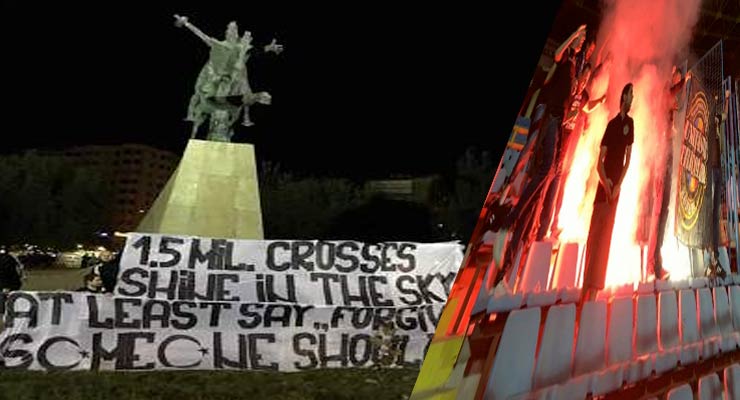 The ruling Social Democrat party in Romania organized a large demonstration to counter anti-government protests held after Social Democrats tried to decriminalize corruption offenses. Protesters were bussed in.
The ruling Social Democrat party in Romania organized a large demonstration to counter anti-government protests held after Social Democrats tried to decriminalize corruption offenses. Protesters were bussed in.
The ruling Social Democrats (PSD) in Romania and thousands of their supporters rallied outside government headquarters in Bucharest on Saturday to protest alleged abuses of power by anti-corruption prosecutors.
The rally was seen as a response by the ruling coalition to a series of large anti-government street protests held against Social Democrat attempts to decriminalize several corruption offenses via emergency decree last year. After the popular outcry, the Social Democrats were forced to withdraw the decree.
The ruling Social Democratic Party believes the prosecutors have too much power and allege that they have tapped phones illegally and have unjustly targeted officials.
The party bussed in supporters from around the country for the rally, while others made it in on their own.
According to Romanian media, numerous local officials, as well as hospital managers and headteachers, had been urging their employees to join the demonstration.
Special trains were made available and the PSD also handed out instructions to make sure the demonstrations are as effective as possible.
According to a leaked party document, there would be one Romanian flag available for every 10 participants and a placard for every 40.
Justice system monitored by EU
How hard to fight corruption in Romania is an argument that has dominated politics there since it joined the EU in 2007.
Romania is one of the European Union’s most corrupt states and Brussels keeps its justice system under special monitoring.
Anti-corruption prosecutors have secured a spate of convictions against lawmakers, ministers and mayors in recent years. Among the topics are exposing conflicts of interest, abuse of power, fraud and the awarding of state contracts in exchange for bribes.
However, leading politicians, some of whom are currently under investigation or on trial, have denied wrongdoing and accused prosecutors of using their powers for political persecution.
They have also accused them of relying too much on tip-offs from third parties to build cases.
“You mustn’t be under the illusion that only high-ranking officials or public servants are targets,” said Social Democratic party leader Liviu Dragnea speaking to thousands of supporters clad in white T-shirts and waving flags.
Local television stations estimated that just under 200,000 people were at the protest, although riot police did not offer official figures.
“Nobody is safe. Absolutely everyone can be targeted by a tip-off which could lead to a conviction,” Dragnea said.
Dragnea himself was convicted in a vote-rigging case, barring him from the post of prime minister. He is now on trial in a separate case for allegedly instigating abuses of office by
other public servants. He is also under investigation on suspicion of pocketing EU funds. He denies wrongdoing in all three cases.
Social Democrat legislators are currently trying to revise the criminal code. Critics have said some of the proposed changes would damage investigations.
av/bw (AP, Reuters

 It is endemic for the leadership of Azerbaijan to voice only their own interpretation of history in a way that easily resembles to the Goebbels-like ideology: “if you tell a lie big enough and keep repeating it, people will eventually come to believe it,”
It is endemic for the leadership of Azerbaijan to voice only their own interpretation of history in a way that easily resembles to the Goebbels-like ideology: “if you tell a lie big enough and keep repeating it, people will eventually come to believe it,”  In an emergency meeting, Romania has repealed a controversial corruption decree. The law set off nationwide protests and would have watered down anti-corruption authorities’ power.
In an emergency meeting, Romania has repealed a controversial corruption decree. The law set off nationwide protests and would have watered down anti-corruption authorities’ power.
 Muslim, Turkish Sevil Shhaideh set to be Romania’s first female prime minister.
Muslim, Turkish Sevil Shhaideh set to be Romania’s first female prime minister. By Vera Martorosyan
By Vera Martorosyan
 Caught by a corruption scandal that had splashed the European Parliament five years, former MEP Adrian Severin, a Romanian who openly defended the interests of Azerbaijan in the Strasbourg Assembly, was sentenced to a term of 3 years and 3 months in prison in Romania for trying to make changes to the legislation of the European Union in exchange for the sum of 100 000 euros, the Sunday Times reported.
Caught by a corruption scandal that had splashed the European Parliament five years, former MEP Adrian Severin, a Romanian who openly defended the interests of Azerbaijan in the Strasbourg Assembly, was sentenced to a term of 3 years and 3 months in prison in Romania for trying to make changes to the legislation of the European Union in exchange for the sum of 100 000 euros, the Sunday Times reported.